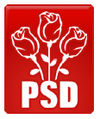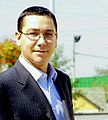- Social Democratic Party (Romania)
-
Social Democratic Party
Partidul Social Democrat
President Victor Ponta Secretary-General Liviu Dragnea Founder Ion Iliescu President of National Council Adrian Năstase Founded 1992 (FDSN)
1993 (PDSR)
16 January 2001 (as PSD)Merger of PDSR and PSDR Headquarters Şos. Kiseleff nr. 10 Bucharest Youth wing Social Democratic Youth Women's wing OFSD Ideology Social democracy[1] Political position Centre-left National affiliation Social Liberal Union International affiliation Socialist International European affiliation Party of European Socialists European Parliament Group Progressive Alliance of Socialists and Democrats Official colors Red Senate 47 / 137Chamber of Deputies 103 / 334European Parliament 11 / 33County Council Presidents 17 / 41County Councils 452 / 1,393Website http://www.psd.ro/ Politics of Romania
Political parties
ElectionsThe Social Democratic Party (Romanian: Partidul Social Democrat, PSD) is the major social-democratic political party in Romania. It was formed in 1992, after the post-communist National Salvation Front (Romania) broke apart. It adopted its present name after a merger with a minor social-democratic party in 2001. Since its formation, it has always been one of the two dominant parties of the country. The Social Democratic Party governed Romania from 1992 to 1996, and from 2000 to 2004. With Ion Iliescu, it also produced a President of the Republic, in office from the end of communism to 1996, and from 2000 to 2004.
After the 2008 Romanian legislative elections the PSD entered into a coalition with the Democratic Liberal Party (PD-L) and formed a government led by PD-L president Emil Boc. Due to considerable disagreements with Boc, the Social Democrats left the coalition government in 2009, and are now again leading the opposition.
The current president of the PSD is Victor Ponta, elected on 20 February 2010.
Contents
History
On 7 April 1992, the struggle for power inside the National Salvation Front (Romanian: Frontul Salvării Naţionale, FSN) between the more hard-line group led by Ion Iliescu and the more reformist group led by Petre Roman resulted in the Iliescu group withdrawing from FSN and the founding of the Democratic National Salvation Front (Romanian: Frontul Democrat al Salvării Naţionale, FDSN), which would later become the present-day PSD.
FDSN won the 1992 elections and went on to govern Romania until 1996. On 10 July 1993 it took the name of Party of Social Democracy in Romania (Romanian: Partidul Democraţiei Sociale in România, PDSR) upon merger with the Socialist Democratic Party of Romania (PDSR), the Republican Party and the Cooperative Party.
From 1994 to 1996 the PDSR ruled in coalition with three extremist parties - the right-wing Romanian National Unity Party (PUNR) and Greater Romania Party (PRM), and the left-wing Socialist Party of Labour. PUNR had ministers in the cabinet chaired by Nicolae Văcăroiu from March 1994 to September 1996. PRM was not present at the Cabinet, but was given some posts in the State administration. The PDSR lost the 1996 election, which was won by the multi-party coalition Romanian Democratic Convention (CDR).
In November 2000 the PDSR was back in power, this time in a coalition named the Social Democratic Pole of Romania along with the Romanian Social Democratic Party (PSDR) and the Romanian Humanist Party (PUR). PSDR merged with PDSR on 16 January 2001, and the resulting party took its present name, PSD.
In November 2004, Adrian Năstase, the PSD candidate, won the first round of the presidential elections but did not have a majority and had to go to a second round of voting, which he lost to Traian Băsescu of the Justice and Truth alliance, who is therefore the current president. In the legislative elections of 2004, the PSD gained the largest share of the vote but because it did not have a majority, all the other major parties formed the Justice and Truth Alliance, which managed to gain a parliamentary majority and is currently in government, consigning the PSD to opposition.
Considered a young reformer, Geoană was elected president of the party in April 2005 by delegates at a PSD Party Congress held in Bucharest. His victory represented a surprise defeat for former President Ion Iliescu, who was expected to defeat Geoană handily. Geoană's win was attributed by the media to last minute backroom dealing by party leaders opposed to Iliescu as well as to public gaffes made by Iliescu at the Party Congress, including using allegedly old communist terms when referring to his party colleagues.[2]
On 17 April 2008, the Social Democratic Party and the Conservative Party announced they would form a political alliance for the 2008 local elections.[3]
In February 2010, the Congress elected Victor Ponta as president.
On 6 February 2011, the PSD formed the Social Liberal Union political alliance with the Conservative Party and National Liberal Party.[4][5]
Structure
Leadership of FSN, FDSN, PDSR and PSD
Presidents:
- Ion Iliescu 1990-1992; (FSN)
- Oliviu Gherman 1992-1996; (FDSN/PDSR)
- Ion Iliescu 1997-2000; (PDSR)
- Adrian Năstase 2000-2005 (acting to 2001); (PDSR/PSD)
- Mircea Geoană 2005-2010; (PSD)
- Victor Ponta 2010–present; (PSD)
Executive presidents
- Adrian Năstase 1993-1997;
- Octav Cozmâncă 2003-2005;
- Adrian Năstase 2005-2006.
- Dan Mircea Popescu 2005-2006, when the office was dissolved (nominated Ad interim after the resignation of Adrian Năstase from the office)
Criticism and allegations
Political opponent have criticised PSD for harbouring former Romanian Communist Party officials, and for allegedly attempting to control the Romanian mass media. A number of its senior members have also been accused of corruption, including interfering in the judiciary and using their political positions for personal enrichment.[6]
Closely guarded text transcripts of PSD meetings surfaced on an anonymous Web site just before the 2004 Romanian presidential election. Năstase and his ministers are shown talking about political involvement in corruption trials of the government's members, or involvement in suppressing "disobedient" media. Năstase stated that the transcripts were fake, but several party members, including former PSD president and former Foreign Minister Mircea Geoană, have said they are indeed genuine. Geoană later retracted his statement.[7]
Adrian Năstase temporarily "self-suspended" himself from the position on January 16, 2006 pending investigation of a scandal provoked by his wealth declaration, where he was accused of corruption.[8]
See also
References
- ^ http://www.parties-and-elections.de/romania.html
- ^ http://www.hotnews.ro/stiri-arhiva-1606213-ion-iliescu-dau-cuvintul-tovarasului-nastase.htm
- ^ Romania's PSD and PC form alliance (SETimes.com)
- ^ http://english.cri.cn/6966/2011/02/06/1461s619327.htm
- ^ http://www.focus-fen.net/index.php?id=n241429
- ^ http://www.hotnews.ro/stiri-politic-6606961-ion-caramitru-demisioneaza-din-conducerea-pntcd-sefii-psd-fosti-nomenclaturisti-sau-copiii-lor-sunt-tarati-originea-comunista-nu-cred-moartea-comunismului-prin-comunisti.htm
- ^ http://www.9am.ro/stiri-revista-presei/2005-08-17/geoana-stenogramele-si-reformarea-psd.html
- ^ http://www.hotnews.ro/stiri-arhiva-1193735-adrian-nastase-autosuspendat-din-conducerea-psd.htm
External links
Parties Member parties (non-EU)Associated parties (EU)Associated parties (non-EU)Observer partiesParty Presidents Wilhelm Dröscher · Robert Pontillon · Joop den Uyl · Vítor Constâncio · Guy Spitaels · Willy Claes · Rudolf Scharping · Robin Cook · Poul Nyrup RasmussenEuropean Parliament
Group PresidentsGuy Mollet · Hendrik Fayat · Pierre Lapie · Willi Birkelbach · Käte Strobel · Francis Vals · Georges Spénale · Ludwig Spénale · Ernest Glinne · Rudi Arndt · Jean-Pierre Cot · Pauline Green · Enrique Barón Crespo · Martin Schulz · see European Parliament
European Commissionners Catherine Ashton (Foreign Affairs and Security Policy) · Joaquín Almunia (Competition) · Maroš Šefčovič (Inter-Institutional Relations and Administration) · Maria Damanaki (Maritime Affairs and Fisheries) · Štefan Füle (Enlargement and European Neighbourhood Policy) · László Andor (Employment, Social Affairs and Inclusion) · see Barroso II CommissionHeads of government
at the European CouncilWerner Faymann (Austria) · George Papandreou (Greece) · Borut Pahor (Slovenia) · José Luis Rodríguez Zapatero (Spain) · see European CouncilEurofoundation: Foundation for European Progressive Studies Romania topics
Romania topicsHistory Timeline · Prehistoric Romania · Dacia · Roman Dacia · Middle Ages · Early Modern Era · National awakening · United Principalities · Kingdom of Romania · World War I · Greater Romania · World War II · Communist Romania · 1989 Romanian Revolution · Since 1989Geography Economy Government Constitution · Parliament (Senate · Chamber of Deputies) · President · Prime Minister · Elections · Political parties · Foreign relations · Government Agencies · Law enforcement · History · Land Forces · Air Force · Naval Forces · Military Police · Administrative divisions · Counties · Cities · Human rights ·Culture Orthodox Christianity · Holy Synod · Judaism · Islam · Postal codes · Languages · Religion · Minorities · Immigration · Romanians · List of Romanians · Academy · Architecture · Art · Cinema (Actors) · Music (Composers) · Cuisine · Romanian language · Literature (Writers • Poets) · List of Romanians · Philosophy · Folklore (Dress) · Humour · Media · Sport · Public holidays · Society · CrimeCoordinates: 44°27′40.46″N 26°4′52.85″E / 44.4612389°N 26.0813472°E
Categories:- Political parties established in 1992
- Political parties in Romania
- Social democratic parties
- Party of European Socialists member parties
- Socialist International
Wikimedia Foundation. 2010.





